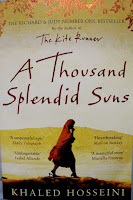Author: Khaled Hosseini
Published: 2007
Genre: Fiction
I read this a couple of years back and was reminded of it again when another blogger mentioned they had just read The Kite Runner, Hosseini's first book, and could not put down. I felt the same way about the Kite Runner, and immediately after reading it I went on to read A Thousand Splendid Suns. This for me was more of harrowing read. I enjoyed it even more than The Kite Runner.
It is a hauntingly sad story that attempts to explain the atrocities suffered by Afghani people after the Taliban came into power. More so, it is about the effect that Taliban rule had on women in Afghanistan. It left me outraged as I tried to fathom, the kind of life that the women of Afghanistan possibly faced under this regime.
Mariam, the protagonist in the book is the illegitimate daughter of a wealthy businessman and his housekeeper. From the onset the fractious relationship between Mariam and her mother, who constantly refers to Mariam as harami- bastard, sets the tone for the life that Mariam will lead. She has a relationship with her father, Jahil, and this is what made the book even sadder for me - this father who dotes on her, and yet is only ever in her life for brief, though sweet moments, once a week because he has another family. Hosseini describes the anticipation that Mariam feels prior to every one of her father's visits in great detail. The anticipation building up in her stomach, two, sometimes three days before. It is heartbreaking to read because the visits are all she has to look forward every week as living with her embittered mother does not offer much else. Her mother denies her an education and reminds her daily of what her lot in life is; to suffer and endure.
It is clear that her mother is hurt by Jahil's acceptance of her daughter Mariam but not of her.
When Mariam is fifteen her mother dies, hanging herself after thinking that Mariam had abandoned her to go and live with her father. Jahil marries Miriam off to Rasheed, a man thirty years her senior. From this chapter follows a lifetime of physical abuse from which Mariam cannot escape; with Rasheed's physical abuse escalating as the years pass and she does not produce any children.
Central to the book is Mariam's and Laila's story. Laila, a young girl in the same village as Mariam becomes the daughter that Mariam never had. Laila's parents are killed in a rocket attack and she is severely injured. It is Mariam who nurses her back to health, at Rasheed's insistence, and between the two women develop strong ties, even though this does not happen overnight. When Rasheed makes Laila his second wife, forcing Mariam into an inferior position in the marriage, I had thought her reaction would be one of relief. But she literally begs Rasheed not to marry Laila, illustrating that her marriage - as abusive as it is- is all she has, and she is willing to hold on to it even if it means being the second choice to the fourteen year old Laila.
The story is told from the perspectives of the the two protagonists; Mariam and Laila, their past, present and what they hope is their future - once they escape from Rasheed. In Laila's life, Mariam witnesses the cycle of abuse- similar to what she went through repeat itself and she is helpless to help her. Rasheed is an indiscriminate abuser, at one point focusing all his violent beatings on the two women simultaneously after they had tried to escape.
There are moments when I found myself holding my breath waiting for scenes to unfold. Hosseini's writing is not rushed, and that just adds to the anticipation. He treats the endless cycle of abuse and suffering of the women over three generations in a matter-of-fact way. Mariam's mother went through it - though hers was not physical, but a rejection that left her emotionally crippled. Mariam goes through the same in her arranged marriage. Laila similarly in the loss of her childhood friend and first love, Tariq; in the loss of her parents; and in her subsequent marriage to Rasheed. Even Laila's daughter, Aziza, who is sent off to an orphanage by her father, endures it in some way. In the end, it is the same abuse and violence which permeates throughout the book that brings an end to Mariam and Laila's suffering. And it is in this end that Hosseini crafts a happy ending. By the time I got to this point though, I was emotionally spent.
A Thousand Splendid Suns is not a feel-good read; only at the very end, if you can last that long will you breathe a sigh of relief. Hosseini writes of real human suffering, not of the self indulgent, navel-gazing variety either, but of the unspeakable, life and death variety. A good but emotionally exhausting book.
Made me want to learn about: The lives of Afghani women prior to the years of Taliban rule.

It's also a story to cherish, a story that shows the strength and ultimate triumph of the human spirit and the power to forgive and go on. A story of hoping against hopelessness, of enduring beyond what we think we cannot and ultimately of the very beauty and value of our lives. It is, mark my words, a story to be remembered and cherished.
ReplyDeleteIt's a book I would read again, with a box of tissues.
ReplyDelete